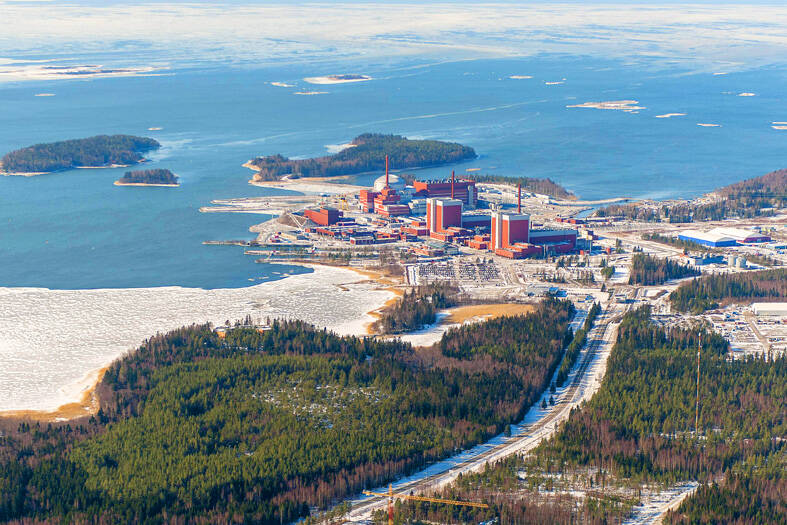Finland’s much-delayed Olkiluoto 3 (OL3) nuclear reactor, Europe’s largest, began regular output early yesterday, its operator said, boosting energy security in a region to which Russia has cut gas and power supplies.
Nuclear power remains controversial in Europe, primarily due to safety concerns, and news of OL3’s start-up came as Germany on Saturday switched off its last three remaining reactors, while Sweden, France, Britain and others plan new developments.
OL3’s operator Teollisuuden Voima Oyj (TVO), which is owned by Finnish utility Fortum Oyj and a consortium of energy and industrial companies, has said the unit is expected to meet about 14 percent of Finland’s electricity demand, reducing the need for imports from Sweden and Norway.

Photo: AFP / TVO / Tapani Karjanlahti
The new reactor is expected to produce for at least 60 years, TVO said in a statement after completing the transition from testing to regular output.
“The production of Olkiluoto 3 stabilizes the price of electricity and plays an important role in the Finnish green transition,” TVO chief executive Jarmo Tanhua said in the statement.
Construction of the 1.6 gigawatt reactor, Finland’s first new nuclear plant in more than four decades and Europe’s first in 16 years, began in 2005. The plant was originally due to open four years later, but was plagued by technical issues.
OL3 first supplied test production to Finland’s national power grid in March last year and was expected at the time to begin regular output four months later, but instead suffered a string of breakdowns and outages that took months to fix.
Russia’s power exports to Finland ended in May last year, when Russian utility Inter RAO said it had not been paid for the energy it sold, a consequence of the widening gulf between Moscow and Europe over the war in Ukraine.
Russian state export monopoly Gazprom PJSC shortly after ended shipments of natural gas to the Nordic nation.
Separately, the German state of Bavaria wants to continue operating nuclear power plants under its own responsibility, state Premier Markus Soeder was quoted as saying, bringing a possible comeback for the power energy Germany finished phasing out on Saturday.
The state, home to many of Germany’s most successful exporting manufacturers, wants the federal government to change the nuclear exit law to allow operating such nuclear power stations under the state’s own responsibility, Soeder said.
“Until the crisis is over, and the transition to renewables succeeds, we must use every form of energy by the end of the decade,” the state government was quoted as saying by Bild am Sonntag newspaper.
“Bavaria is ready to take on this responsibility,” Soeder said, adding that Bavaria also wants to be a pioneer in nuclear fusion research and to construct of its own research reactor.

The US dollar was trading at NT$29.7 at 10am today on the Taipei Foreign Exchange, as the New Taiwan dollar gained NT$1.364 from the previous close last week. The NT dollar continued to rise today, after surging 3.07 percent on Friday. After opening at NT$30.91, the NT dollar gained more than NT$1 in just 15 minutes, briefly passing the NT$30 mark. Before the US Department of the Treasury's semi-annual currency report came out, expectations that the NT dollar would keep rising were already building. The NT dollar on Friday closed at NT$31.064, up by NT$0.953 — a 3.07 percent single-day gain. Today,

‘SHORT TERM’: The local currency would likely remain strong in the near term, driven by anticipated US trade pressure, capital inflows and expectations of a US Fed rate cut The US dollar is expected to fall below NT$30 in the near term, as traders anticipate increased pressure from Washington for Taiwan to allow the New Taiwan dollar to appreciate, Cathay United Bank (國泰世華銀行) chief economist Lin Chi-chao (林啟超) said. Following a sharp drop in the greenback against the NT dollar on Friday, Lin told the Central News Agency that the local currency is likely to remain strong in the short term, driven in part by market psychology surrounding anticipated US policy pressure. On Friday, the US dollar fell NT$0.953, or 3.07 percent, closing at NT$31.064 — its lowest level since Jan.

The New Taiwan dollar and Taiwanese stocks surged on signs that trade tensions between the world’s top two economies might start easing and as US tech earnings boosted the outlook of the nation’s semiconductor exports. The NT dollar strengthened as much as 3.8 percent versus the US dollar to 30.815, the biggest intraday gain since January 2011, closing at NT$31.064. The benchmark TAIEX jumped 2.73 percent to outperform the region’s equity gauges. Outlook for global trade improved after China said it is assessing possible trade talks with the US, providing a boost for the nation’s currency and shares. As the NT dollar

The Financial Supervisory Commission (FSC) yesterday met with some of the nation’s largest insurance companies as a skyrocketing New Taiwan dollar piles pressure on their hundreds of billions of dollars in US bond investments. The commission has asked some life insurance firms, among the biggest Asian holders of US debt, to discuss how the rapidly strengthening NT dollar has impacted their operations, people familiar with the matter said. The meeting took place as the NT dollar jumped as much as 5 percent yesterday, its biggest intraday gain in more than three decades. The local currency surged as exporters rushed to